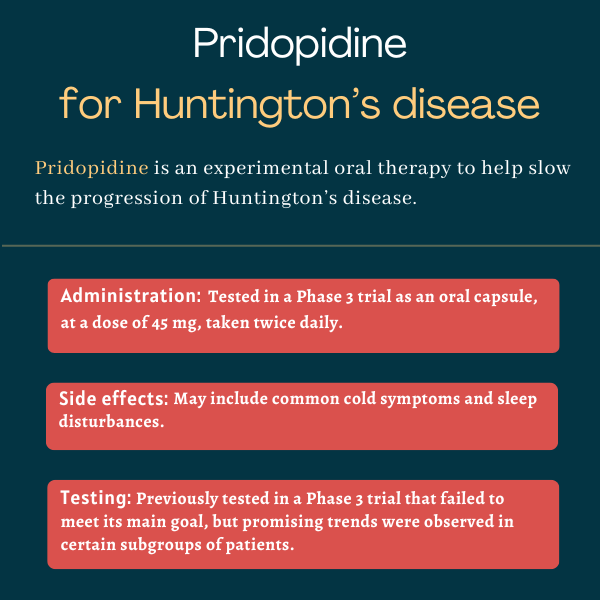Pridopidine for Huntington’s disease
Last updatedFeb. 7, 2025, by Marisa Wexler, MS

What is pridopidine for Huntington’s disease?
Pridopidine, formerly known as ACR16 and Huntexil, is an experimental oral therapy being developed by Prilenia Therapeutics for people with Huntington’s disease.
Originally developed by Arvid Carlsson Research laboratories, the medication is expected to have neuroprotective effects and to slow Huntington’s progression.
Pridopidine received orphan drug designation in both the U.S. and European Union (EU) and fast track designation in the U.S. for Huntington’s. These statuses are meant to accelerate the therapy’s clinical development and regulatory review by providing financial incentives and regulatory support.
In September 2024, Prilenia filed a regulatory application seeking pridopidine’s approval for Huntington’s in the EU, and is discussing with the U.S. Food and Drug Administration a potential path for approval in the U.S.
Prilenia is also testing pridopidine for amyotrophic lateral sclerosis, another neurodegenerative disease.
Therapy snapshot
| Treatment name: | Pridopidine |
| Administration: | Being tested in Huntington’s as an oral capsule |
| Clinical testing: | Completed a Phase 3 clinical trial that failed to meet its main goal |
How does pridopidine work in Huntington’s disease?
Huntington’s is an inherited disease marked by progressive neurodegeneration that leads to motor and nonmotor symptoms. It is caused by mutations in the HTT gene that lead to the production of an abnormal huntingtin protein which forms toxic clumps inside nerve cells, promoting their death.
Pridopidine is a small orally available molecule that is able to reach the brain and spinal cord. It was originally described as a stabilizer of dopamine, a major brain chemical messenger involved in movement control and whose signaling is altered in Huntington’s.
The small molecule was shown to block the activity of a dopamine receptor protein, suggesting its potential to ease motor symptoms in Huntington’s by modulating dopamine-related motor pathways.
Additional research showed pridopidine strongly binds to, and activates, sigma-1 receptor, a protein that regulates a range of cellular processes commonly impaired in Huntington’s and other neurodegenerative diseases.
Activating the protein has been shown to increase levels of brain-derived neurotrophic factor, a signaling molecule that helps support nerve health and whose levels are typically low in Huntington’s patients.
Pridopidine has also been shown to promote the clearance of toxic proteins and lessen inflammation, as well as to boost energy production and reduce oxidative stress — a type of cellular damage implicated in Huntington’s.
Through all these varied effects, the therapy is expected to protect nerve cells from damage and death, ultimately easing symptoms and slowing disease progression in Huntington’s.
How is pridopidine administered in Huntington’s disease?
Pridopidine is available in the form of oral capsules, which are designed to be small and easy to swallow, according to Prilenia. In the latest Phase 3 trial, the therapy was taken as a 45 mg capsule, twice daily.
Pridopidine in Huntington’s disease clinical trials
In preclinical studies, pridopidine significantly slowed motor symptom progression, reduced the size of toxic huntingtin clumps, and showed several neuroprotective effects in a mouse model of Huntington’s.
HART and MermaiHD
The therapy’s late-stage clinical development initially comprised two clinical trials, one in North America called HART (NCT00724048) and one in Europe called MermaiHD (NCT00665223).
The Phase 2b HART study evaluated the safety and effectiveness of pridopidine against a placebo in 227 adults with Huntington’s. Participants were randomly assigned to receive one of three daily doses of pridopidine (20, 45, or 90 mg) or a placebo for 12 weeks (about three months).
The Phase 3 MermaiHD trial tested two pridopidine daily doses (45 and 90 mg) versus a placebo in 437 adults with Huntington’s. Treatment was given for 26 weeks (about six months).
In both studies, the main goal was to test if pridopidine was superior to a placebo at easing motor symptoms, as measured by a motor subscale of the Unified Huntington’s Disease Rating Scale (UHDRS).
Results from both HART and MermaiHD showed no significant effect of treatment relative to a placebo on this measure, failing to meet their main goal. However, in both studies, the 90 mg pridopidine dose (taken as a 45 mg capsule twice daily) was linked to a significantly greater reduction in UHDRS-Total Motor Score relative to the placebo, indicating less severe motor symptoms.
PRIDE-HD
Based on the promising efficacy signals observed with the highest pridopidine dose tested in these trials, Prilenia sponsored a large, global Phase 2 trial called PRIDE-HD (NCT02006472) to investigate if higher doses would lead to better results and still be safe.
The study enrolled 408 adults with Huntington’s who were randomly assigned to take either a placebo or pridopidine, at doses ranging from 45 mg up to 112.5 mg twice daily, for about one year.
PRIDE-HD’s main goal was to test whether pridopidine treatment was superior to a placebo at easing motor symptom severity, as assessed with the UHDRS-Total Motor Score, after six months.
However, as in earlier studies, top-line results were negative, with no significant differences in score change after six months between patients on the placebo and those treated with pridopidine at any dose. Group differences remained non-significant after one year of treatment.
However, an exploratory analysis showed scores of total functional capacity (TFC) — a part of the UHDRS that measures a person’s ability to perform daily activities — were significantly less likely to worsen in patients on 45 mg of pridopidine twice daily than in those on a placebo after one year. These benefits were more pronounced among patients with early-stage Huntington’s.
These findings suggested pridopidine’s 90 mg daily dose could help slow the decline in functional abilities for Huntington’s patients. This was also supported by data from up to five years of treatment with 45 mg of pridopidine twice daily in Open-HART (NCT01306929), an open-label extension study that included HART and PRIDE-HD participants.
Specifically, the decline in UHDRS-TFC scores was slower among patients treated with pridopidine in Open-HART relative to what was reported for Huntington’s patients given a placebo in a previous non-related Phase 3 trial called 2CARE (NCT00608881).
PROOF-HD
To further test if pridopidine could slow the decline in functional abilities for people with early-stage Huntington’s, Prilenia teamed up with the Huntington Study Group to launch a Phase 3 study called PROOF-HD (NCT04556656).
Started in 2020, the global PROOF-HD study included a total of 499 people, ages 25 and older, with early Huntington’s, who were randomly assigned to receive either pridopidine (45 mg twice daily) or a placebo for 65 weeks, or little over one year.
The study’s main goal was to assess whether pridopidine treatment was associated with a slower drop in UHDRS-TFC scores relative to a placebo. Secondary goals included changes in composite UHDRS scores — a measure of disease progression that combines scores of measures of functional capacity, motor skills, and cognitive skills.
Top-line data showed, however, that none of these goals were met, as there were no significant group differences in the rate of decline in either measure.
During PROOF-HD, participants were allowed to continue use of stable doses of symptomatic treatments such as antipsychotics and therapies to reduce chorea, or the involuntary, jerky movements that are a hallmark of Huntington’s.
As these therapies might make it harder to demonstrate pridopidine’s benefits on patients’ functional capacity, researchers also conducted analyses looking only at participants who were not on such treatments.
Analyses that excluded patients taking antipsychotics and/or anti-chorea medications indicated changes in UHDRS-TFC scores tended to be better with pridopidine than with a placebo, though the difference was not statistically significant.
In these patients, pridopidine was associated with a clinically meaningful and significantly slower decline in composite UHDRS scores relative to a placebo. Similar benefits were seen in Q-Motor — an objective, computerized measure of motor function — and in a cognitive measure called the Stroop Word Reading Test.
Additional analyses showed pridopidine treatment increased responder rates in these efficacy measures across all visits.
Pooled data from four previous placebo-controlled pridopidine trials in Huntington’s also demonstrated significantly greater benefits in these three measures with the experimental therapy versus a placebo among patients not on antipsychotics and/or anti-chorea medications, according to Prilenia.
Participants completing PROOF-HD’s placebo-controlled treatment period could choose to enroll in the trial’s open-label extension phase, in which all receive pridopidine for a longer period.

Common side effects of pridopidine
Pooled analyses of available data from Huntington’s placebo-controlled clinical trials suggested the 90 mg daily dose of pridopidine may be associated with higher rates of certain adverse events compared with a placebo, including:
- cold-like symptoms
- sleep disturbances.
Huntington’s Disease News is strictly a news and information website about the disease. It does not provide medical advice, diagnosis, or treatment. This content is not intended to be a substitute for professional medical advice, diagnosis, or treatment. Always seek the advice of your physician or other qualified health provider with any questions you may have regarding a medical condition. Never disregard professional medical advice or delay in seeking it because of something you have read on this website.
Recent Posts
- Childhood trauma affects adult children in Huntington’s families
- Like the Hulk, my wife sometimes struggles to hold it together
- What I want medical students to know about Huntington’s and bias
- Ingrezza treatment eases disease burden due to Huntington’s chorea
- A murder trial opened my eyes about Huntington’s and face reading
- What I want people to stop saying about Huntington’s disease
- HDSA 2025: Dance classes may improve balance in Huntington’s
- HDSA 2025: Long-term care transition requires communication
- Guest Voice: Huntington’s disease is rare, but love isn’t
- HDSA 2025: Observational studies in Huntington’s now enrolling in US
Related articles




